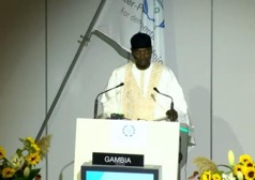Section 18 of the 1997 Constitution guarantees the right to life, which includes the prohibition of arbitrary deprivation of life except in the lawful execution of a death sentence imposed by a court of law.
Currently, however, the enforcement of the death penalty has been suspended, as in 2017, at the 53rd independence celebration, President Adama Barrow declared a moratorium on the use of the death penalty, which is still being observed.
According to the NHRC, The Gambia ratified the Second Optional Protocol to the International Covenant in Civil and Political Rights aimed at the abolition of the death penalty in 2018.
Again, The Gambia accepted the recommendation to abolish the death penalty during the 2019 Universal Periodic Review (UPR).
"However, the death penalty remains in the statute books of The Gambia and continues to be passed in judgments where persons are convicted of offences punishable by the death penalty," NHRC stated.
"For instance, on 14 July 2021, Yankuba Touray, a former Minister of Local Government in the early days of Yahya Jammeh's rule was sentenced to death by the High Court in Banjul for the murder of Ousman Koro Ceesay, who was one-time Finance Minister."
"In this case, the Court held that Section 188 of the Criminal Code, which provides that a person convicted of murder shall be sentenced to death, still stands as it has not been amended or repealed, and that the Court does not have the discretion to hand a different sentence. The Court adjudged that the sentence shall be executed by hanging.
Similarly, on 29 July 2021, one Saidou Cham was also convicted of murder and sentenced to death by the High Court in Basse.
Nevertheless, in both cases, the executions have not yet been carried out and the convicts are behind bars as death row inmates pending further appeals.
Moreover, NHRC added that the phenomenon of the "death row" of convicts has been criticised for being degrading and inhumane, and on that basis, the imposition of the death penalty is contrary to the human right to dignity.
"Under Section 18(3) of the 1997 Constitution, 'the National Assembly shall within 10 years from the date of the coming into force of this constitution review the desirability or otherwise of the total abolition of the death penalty in The Gambia.'
"This timeline has elapsed but the provision has not been reviewed as the state continues to show reluctance to abolish the death penalty.
Therefore, NHRC has urged state to repeal the death penalty from the law books in line with the Second Optional Protocol and the International Covenant on Civil and Political Rights, which the state has ratified.
In addition, the commission has also called on the state to commute all death sentences imposed on all inmates to life imprisonment and to also expedite the enactment of the Criminal Code and the Criminal Procedure Bills that are currently before the National Assembly.
Finally, the commission also urges the state to include in the next Periodic Report to the Human Rights Committee information on the measures adopted by the state to give effect to the Second Optional Protocol to the International Covenant on Civil and Political Rights.





